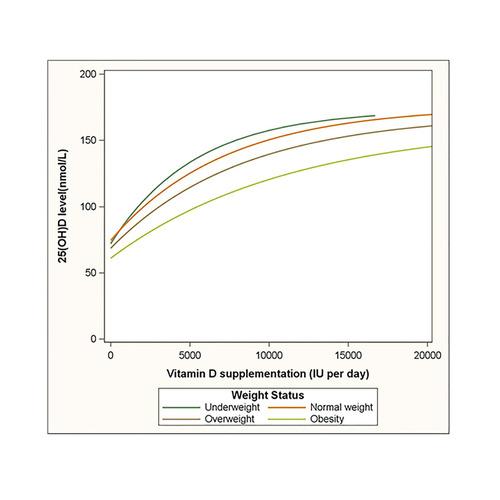Overweight? You Might Need a Lot More Vitamin D

Vitamin D is called the “sunshine vitamin” because the body produces it through sun exposure. But about 3 out of 4 Americans aren’t getting all the vitamin D they need. (Photo by Vladimir Serov/Blend Images/Corbis)
How much vitamin D should you take? Our current guidelines suggest identical amounts for 1-year-old kids all the way to 70-year-old adults. But new research has disproved this one-size-fits-all dosage, suggesting we consider one factor over all others — your weight.
First, a little background
There are two different vitamin D dosage recommendations floating around out there. The official Recommended Daily Allowance (RDA) from the Institute of Medicine does not account for body size — suggesting that folks of varying heights and weights consume an identical dose. The Endocrine Society, on the other hand, recommends that obese adults take two to three times more vitamin D in order to meet their body’s needs.
This week, Canadian researchers published the first large study to confirm the Endocrine Society’s recommendations for obese individuals. The study also adds that overweight people need extra vitamin D as well.
Low vitamin D levels are linked to a higher risk of developing high blood pressure, diabetes, stroke, and of dying from cancer and heart disease. The vitamin also helps the body absorb calcium, a mineral that keeps your bones strong.
Why your weight matters when you take vitamin D
Vitamin D is most useful to the body when it’s in the bloodstream. That’s why experts use a serum vitamin D blood test to assess whether a person is deficient in the vitamin. But vitamin D is also fat soluble, meaning that it’s absorbed by body fat.
“So if you have a large body with lots of body fat, then that’s where the vitamin D goes,” said study author Paul J. Veugelers, director of the Population Health Intervention Research Unit at the University of Alberta in Canada.
Body fat cells absorb vitamin D quickly, removing it from the blood, Veugelers told Yahoo Health. When that happens, the vitamin isn’t available for the metabolic processes that use it. In order to reach a healthy blood level of vitamin D, therefore, an obese person needs to supplement with more vitamin D than a normal-weight person.
Landmark study questions current guidelines
Scientists knew about the relationship between body size and vitamin D, but no study had clearly established exactly how much more vitamin D obese people need to take. Veugelers and his colleagues were finally able to answer this question by using data from a nonprofit health promotion campaign operating in the Canadian province of Alberta.
Related: Supplements: How to Cut Through the Nonsense
Because Alberta is so far north, many of its residents are at risk for vitamin D deficiency due to a lack of sun exposure, and the campaign made vitamin D supplementation one of its key messages. Participants in the program had their height and weight measured, and reported how much vitamin D they took daily. They also had their blood drawn and tested for vitamin D levels. The University of Alberta team crunched the data — more than 22,200 samples from about 17,600 volunteers — to try to understand how supplements impact blood levels.
On average, obese and overweight subjects had lower serum vitamin D levels than normal-weight individuals, and they had lower blood concentrations at any given amount of supplementation.

Blood concentrations of vitamin D depend on the amount supplemented per day and weight status. (Graph: PLoS One 2014 Nov 5;9(11):e111265)
The researchers also calculated how much vitamin D people would need to take in order to reach a blood serum level of 100 nmol/L. (Less than 30 is generally considered deficient, although some experts say deficiency occurs below 50.) On average, normal-weight adults would reach that benchmark with about 2,000 IU (international units) daily — the amount in many over-the-counter D supplements. Overweight people would need 3,000 IU, and obese people would need about 5,500 IU. The findings led the research team to conclude that overweight individuals should take 1.5 times the dose of normal-weight people and that obese individuals should double or triple their dose.







